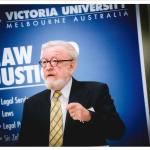Lawyers Call for Drug Decriminalisation: An Interview With ALHR’s Kerry Weste

Uniting launched the Fair Treatment campaign last October, which calls for the decriminalisation of the use and personal possession of illicit drugs, along with increased investment in harm reduction and treatment.
The NSW campaign has the support of over 60 civil society organisations, which includes an expected showing from medical and harm reduction networks. But, what’s perhaps less expected is the support coming from a range of bodies representing the legal profession.
The Law Society of NSW, the NSW Bar Association, Community Legal Centres NSW and the Women’s Legal Service NSW all appear on the list, in what might be seen as those at the frontline of applying the law, acknowledging that when it comes to drugs, criminalisation causes more harm than good.
Reducing the harms
Harm reduction is an approach to drug use that recognises that while certain substances remain illegal, people are still going to take them. So, rather than doubling down on punishment, it’s best to put mechanisms in place that reduce the harms associated with their use.
Australia was once at the global forefront of harm reduction. Indeed, since 1985, harm reduction has formed the basis of the National Drug Strategy. And in the mid-1980s, the push for needle and syringe programs in NSW – led by Dr Alex Wodak – prevented a major HIV outbreak.
The Uniting Medically Supervised Injecting Centre in Sydney’s Kings Cross was the first of its kind in the English-speaking world, when it opened its doors in 2001. And over its time in operation, it’s prevented over 6,000 potentially fatal overdoses.
However, today, despite the fact that five young people died in drug-related circumstances at festivals last summer, NSW premier Gladys Berejiklian refuses to consider pill testing. She claims there’s no evidence that it works, even though in Europe, it’s been successfully used since the 90s.
The Portuguese model
And reducing harms is what decriminalising drugs is all about. The system of decriminalisation that Portugal has had in place since 2001, is the shining example of just how beneficial moving towards a health approach – and away from law enforcement – actually is.
In Portugal, if an individual is found in possession of a quantity of drugs deemed a personal amount, they’re not arrested or charged. Rather, they’re sent before a dissuasion panel – comprised of a lawyer, health practitioner and a social worker – who decide whether treatment is needed.
And the results speak for themselves. The number of people going before the courts for drug offences has plummeted, as have overdose deaths and drug-related HIV transmissions. And there hasn’t been a significant rise in the use of illicit substances either.
For human rights
Australian Lawyers for Human Rights (ALHR) is an association of legal professionals that actively promotes awareness of international human rights standards in this country. Established in 1993, ALHR supports decriminalising the personal possession and use of illicit substances.
Sydney Criminal Lawyers spoke to ALHR president Kerry Weste about the benefits of moving away from treating personal drug use as a crime, the association’s position on pill testing, and the need for those in parliament to listen to the evidence in support of decriminalisation.
Firstly, there’s increasing evidence from around the globe that the war on drugs has been a failure. Ms Weste, how would you describe the outcomes of this intensification of law enforcement around drug prohibition over the last 50 years?
The war on drugs has led to governments criminalising the use of drugs, as well as their possession. As organisations like Human Rights Watch have documented, this approach to drug policy has globally profound human rights consequences.
Rather than reduce the harm caused by substance misuse and addiction, by treating people with a medical problem as criminals the war on drugs has too frequently cost people who use drugs their health, their ability to get the help they need to overcome addiction, and even their lives.
Taking this approach to drug use has undermined people’s right to life, to the highest attainable standard of health, their right to privacy, and it has led to growing prison populations, disproportionate punishment, unnecessary and damaging contact between children and the criminal justice system, as well as being a contributor to the violence that’s associated with organised drug crime.
What it has not done is stopped people from using drugs. It has not stopped people from experimenting with drugs.
It has not helped the people in our society who are vulnerable to addiction, nor kept them safe and healthy. It has not helped to address the connection between substance abuse and domestic violence.
According to the 2016 National Drug Strategy Household Survey published by the Australian Institute of Health and Welfare, three million Australians aged over 14 used illicit drugs within the preceding 12 months.
It is estimated by the Australian Criminal Intelligence Commission that in 2016 Australians spent over $9.3 billion on illicit recreational drugs.
We desperately need a shift from criminalising drug use and possession to evidence-based drug policy formulated within a human rights framework and focused primarily on harm reduction.
The major reason behind drug prohibition is the protection of people from the harms that drugs cause. However, drug law reformists increasingly assert that the harms caused by the criminalisation of drugs far outweigh those associated with their use.
What’s your opinion on the harms related to drug prohibition compared with those caused by the drugs themselves?
There is no doubt that many of the drugs which are today in the category of illicit drugs have the potential to cause people serious harm.
This is precisely why ALHR is of the very strong view that laws and policies relating to personal drug use must have harm reduction as their central focus and should aim to minimise the negative health and legal impacts associated with drug use.
This necessitates the creation of drug policy that prioritises avoiding deaths and minimising harm. Those advocating for this kind of reform are not promoting or condoning drug use, nor denying the harm caused by drugs.
Criminalising drug addiction deters people from accessing vital health services, thereby increasing the risk of serious illness associated with drug use, increasing stigmatisation within society, isolation and discriminatory treatment.
Even for recreational or experimental drug use – and this is especially so for children and young people – the criminalisation of drugs can act as a deterrent to accessing medical help when it is urgently needed.
Currently, the amounts that are spent on proven harm reduction strategies remain small, when compared with the funds spent on law enforcement.
The March 2019 International Guidelines on Human Rights and Drug Policy was authored by the World Health Organisation, the United Nations Development Program, the Joint United Nations Programme on HIV/AIDS and the International Centre on Human Rights and Drug Policy.
It establishes that, in accordance with the right to health, all countries should ensure the availability and accessibility of harm reduction services.
Harm reduction involves initiatives such as community and school education programs about the risks associated with drug use, drug consumption rooms, needle and syringe programmes and drug checking, as part of a holistic approach to drug policy.
A number of countries, including Switzerland, the UK, Germany, the Netherlands, and Canada, prescribe heroin for use under medical supervision – Heroin Assisted Treatment (HAT) – as part of successful programmes to treat long-term users of illicit opioids.
There is now a substantial body of evidence demonstrating the effectiveness of HAT. And this provides useful lessons for managing one of the most risky and problematic forms of drug use as a public health challenge, rather than a criminal justice one.
Approaches such as these are cost-effective, evidence-based and have a positive impact on individual and community health.
There are rising calls within the community and civil society organisations for personal drug possession and use to be decriminalised. What sort of impact would such a move have on the criminal justice system?
Imprisoning people who use drugs does nothing to protect their health, nor to deter them from using drugs. In fact, recidivism for drug offenders is very common because the criminalisation of personal drug use and possession traps addicts in a cycle of drug-related crime and incarceration.
Both recreational drug use and drug addiction should be approached as health issues, not as criminal ones.
Australian Lawyers for Human Rights strongly supports the decriminalisation of personal drug possession and use.
This is consistent with the International Guidelines on Human Rights and Drug Policy, which call on countries to utilise the available flexibilities in the United Nations drug control conventions to decriminalise the possession, purchase, or cultivation of controlled substances for personal consumption.
The guidelines also specifically note that where children are concerned the efforts of governments should be primarily targeted at diversion from the criminal justice system and the promotion of rehabilitation over punishment.
We should not be criminalising children because of their drug use or possession of drugs for personal use. And Australian laws should adhere to international juvenile justice standards in all efforts to address and respond to drug-related criminality among children and young people.
In November 2018, the United Nations Chief Executives Board – comprising 31 heads of UN agencies and associated programs – released a policy statement endorsing the decriminalisation of drug possession for personal use.
The same document also outlines a broader intent to shape international drug policy in terms of public health, human rights and sustainable development.
The “directions for action” provided in the statement include a pledge “to promote alternatives to conviction and punishment in appropriate cases, including the decriminalisation of drug possession for personal use”.
A shift from criminalisation to a justice reinvestment approach would mean that the millions of dollars spent prosecuting and imprisoning people for personal drug possession and use would achieve better long-term outcomes for individuals and society as a whole if invested early in targeted evidence-based drug programs.
For instance, money that would otherwise be spent on policing, court proceedings and incarceration would be better used ensuring the availability and accessibility of adequately funded harm reduction services appropriate for the needs of particular vulnerable or marginalised groups.
The many millions of dollars saved could also be directed toward the development of other evidence-based interventions aimed at minimising the adverse health risks and harms associated with drug use.
Last summer, five young Australians died at NSW music festivals. These tragedies heightened the calls for pill testing at such events.
The trialling of pill testing is supported by most major medical associations. However, the NSW premier refuses to consider the option, stating there’s no evidence that it works.
What’s ALHR’s opinion on the provision of pill testing? And what do you think about the premier’s stance?
ALHR supports a human rights-based harm reduction approach to drug laws and policies.
Illicit drug use is extremely dangerous – particularly for young people – whose brains are still developing and who are more vulnerable to drug-induced mental health problems.
These dangers are compounded by the fact that because most of the drugs used at music festivals are manufactured in illegal backyard laboratories, there is no way of knowing what they actually contain.
Pill testing is available in the Netherlands, Switzerland, Austria, Belgium, Germany, Spain and France. And there is in fact evidence that it leads to better health outcomes and decision-making.
For example, research from Austria shows 50 percent of those who had their drugs tested said the results affected their consumption choices. Two-thirds said they wouldn’t consume the drug and would warn friends in cases of negative results.
Pill testing is a simple harm minimisation intervention that can save lives. It is not a panacea to the dangers and risks associated with taking recreational drugs. Rather, it is part of a suite of evidence-based harm reduction measures that approach drug use as a health issue, rather than a law and order one.
These allow young people who have chosen to experiment to be informed about what they are putting into their bodies. It also provides an invaluable opportunity for drug services to reach and educate recreational drug users.
ALHR urges premier Berejiklian and the NSW government to run a trial of pill testing and assess its benefits and harms, so we can then make an informed choice about this intervention.
This position is consistent with that of multiple organisations across Australia, including the Royal Australian College of Physicians, who have supported such trials if conducted in purpose-designed facilities by appropriately qualified technical specialists and accompanied by advice and information to allow festivalgoers to make informed choices.
The current approach to drug use at musical festivals is not focused on harm reduction and aspects of it are increasingly noncompliant with Australia’s international legal obligations to protect rights to privacy and dignity.
A recent report by UNSW and the Redfern Legal Centre confirmed that in the past 12 years we have seen an almost 20-fold increase in the number of strip searches being conducted by the NSW police, with people under 25 the most likely to be strip searched.
If we want to save lives and keep young people safe, we must move away from punitive law enforcement approaches.
The Uniting Church launched the Fair Treatment campaign last year. It’s calling for drug decriminalisation in NSW. How does ALHR sit with this campaign?
Fair Treatment is a grassroots campaign that seeks the decriminalisation of possession and personal use of small amounts of illicit drugs, as well as investment into harm reduction treatment.
This is an important campaign and ALHR fully and enthusiastically supports it.
And lastly, Ms Weste, while the support for drug decriminalisation is growing in the community, including amongst lawyers and even former police, in parliament it’s still a problematic subject that politicians shy away from.
What does ALHR see has to occur so that legislation actually appears in parliament with the aim of turning illicit substance use into a health issue, rather than a criminal act?
ALHR believes that all law and policy must be formulated from within a human rights framework.
It is this that will lead to better, evidence-based reform of drug laws.
Our politicians need access to educative resources. Most importantly, though, they need to give frontline services and those directly impacted by the current law and order approach to drug use a voice and respect their internationally recognised human right to meaningful participation in the design, implementation, and assessment of drug laws, policies, and practices.
If politicians engage in this debate with an open mind and a sincere intention to reduce the harm caused by drugs and respect people’s human rights, then we are confident they will have no choice but to see illicit substance use as a health issue, rather than a criminal act.







